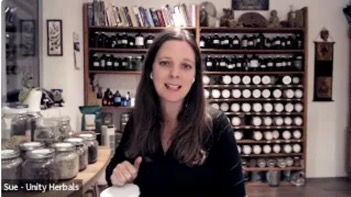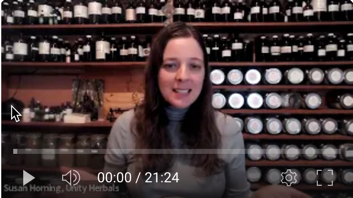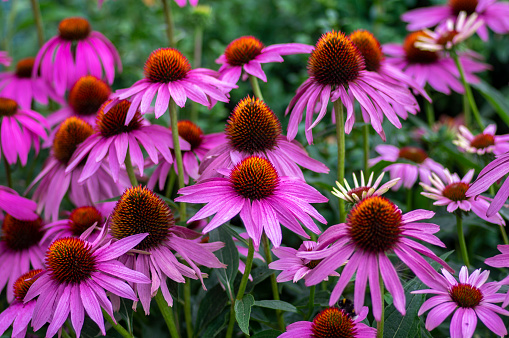Blending Tasty Tisanes for pleasure and delight
Watch my instructional video on this topic on YouTube: https://youtu.be/6dqAkBoWfdE
This talk was offered as a contribution to the The Canadian Herb Conference 2021.
Using our senses is the best way to determine what will make tasty tea. Organoleptics is using our sense organs to determine flavour, aromas, freshness, and beauty of herbal tea blends. Start with whole plants, and leave out additives or artificial flavours, using herbs to naturally flavour a discerning palate.
Infusions vs decoctions – this talk is only on infusions to keep scope, but decoctions make some of the best medicinal drinks you can formulate! This includes all the mushrooms, most of the roots and barks, and fruit. Infusions can be refrigerated for 2-3 days, concentrated infusions are steeped overnight, and cold infusions are prepared without heat.
Water is a great extractor and it makes it easy for the body to digest and assimilate, but it also can breed bacteria so being careful not to allow infusions to go bad. Plant teas are full of phenolic and flavonoid compounds – secondary metabolites in plants that are beneficial and easily absorbed into the human body. The most common form being glycosides, which are easily soluble in water! Polyphenols such as flavonoids, phenolic acids, tannins, lignans, and coumarins – all help the body to counteract inflammation and fight stress. Plant polyphenols are highly antioxident, prevent oxidative stress and diseases such as cancer and may also confer antimicrobial, antifungal, and anticarcinogenic qualities. Mineral rich herbs go great in tea, or can be extracted in apple cider vinegar to last longer.
Teas encourage kidney action, and bolster nutrition. Herbal infusions given as tea can be profoundly healing for the gut. Black and green teas are stimulating and astringent, and steep more quickly than herbal teas (1 min for black teas and 2-3 minutes for most green teas) so they are less useful in herbal blends, which usually need 10-15 minutes to completely infuse.
Here are my nine favourite basic herbal teas to keep on hand as starter teas that have great gut healing qualities:
1. Chamomile (Matricaria recutita) – Antiemetic, antiinflammatory, antimicrobial, bitter, carminative, antispasmodic, demulcent, nervine relaxant. GI (IBS, colitis), sleep support. Volatile oils, flavonoids (sedative/antispasmodic), coumarins (antifungal/antibacterial).
2. Tulsi (Occimum sanctum) – Adaptogen, analgesic, anthlemintic, antimicrobial, antioxidant, carminative, cardiovascular tonic, cerebral stimulant, expectorant, hepatoprotective, immunomodulating, neuroprotective, relaxing nervine.
3. Lemonbalm (Melissa officinalis) – Animicrobial, antithyroid, cardiotonic, carminative, antispasmodic, nervine relaxant and tonic. Dyspepsia with anxiety and/or depressive mood, hyperthyroidism (inhibits binding of TSH), anxiety, palpitations, headache, excitability, depression, strengthens brain and resistance to stress/shock, tonic to the heart and circulatory system, for viral infections/neuralgias.
4. Peppermint (Menta x pipperita) – Mild analgesic, antiemetic, anti-inflammatory, antimicrobial, carminative/antispasmodic, choleretic/cholagogue, diaphoretic, expectorant. IBS, intestinal colic, nausea.
5. Raspberry Leaf (Rubus ideaus) – Astringent, Uterine tonic, partufacient, thermogenic agent. For labour prep, dysmenorrhea, menorrhagia, post partum, hemmorrhage, diarrhea and enteric disorders, bacterial infection, pain, inflammation of the GI tract.
6. Rooibos (Aspalanthus linearus) – low in tannins and no caffeine. Bronchodilator, lowers blood sugars, antispasmodic, antiinflammatory, carminative, May protect against stroke, cancer, and heart disease.
7. Nettles (Urtica dioica) – Antilithic (urinary), alterative, anti-inflammatory, antirheumatic, astringent, diuretic, hemostatic, hypoglycemic, nutritive, drying. Increases urine output significantly, increases removal of uric acid, replenishes nutrients and electrolytes. For edema, swollen joints, arthritis, congestive heart disease, BPH, uterine hemorrhages, any chronic degeneration of musculoskeletal system such as RA, OA, gout, joint pain, myalgia, kidney trophorestorative (seeds).
8. Yerba Mate (Ilex paraguariensis) – CNS stimulant, diuretic, antirheumatic, inhibit atheroscerosis by adhering to LDL particles, hepatoprotective, antioxidant.
9. Green or Black Tea (Camelia sinensis) – Antimicrobial, antioxidant, cytotoxic, anticancer, astringent, cardiotonic, diuretic, immunostimulant, nervine stimulant. Exhaustion, headaches, fatigue, immune and inflammatory modulating activity can also be benecicial in fever, cough, colds/flu, infections. Antimicrobial againsta bacteria, protozoa, viruses. Preventative for arteriosclerosis, high cholesterol, heart conditions.






